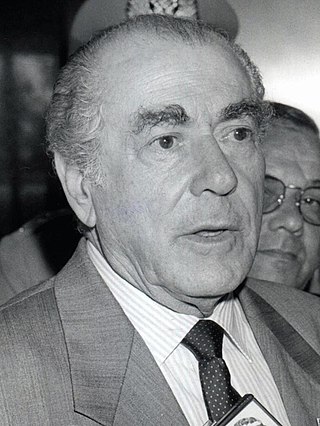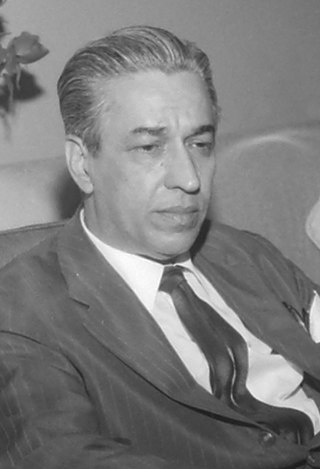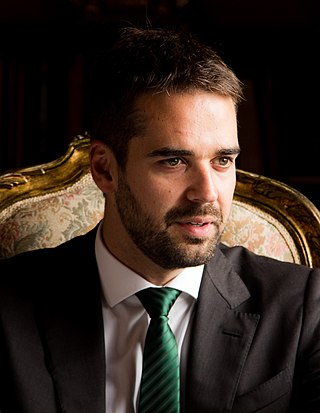
Porto Alegre is the capital and largest city of the Brazilian state of Rio Grande do Sul. Its population of 1,488,252 inhabitants (2020) makes it the 12th-most populous city in the country and the center of Brazil's fifth-largest metropolitan area, with 4,405,760 inhabitants (2010). The city is the southernmost capital city of a Brazilian state.

The Federal University of Rio Grande do Sul is a Brazilian public federal research university based in Porto Alegre, Rio Grande do Sul. UFRGS is among the largest and highest-rated universities in Brazil, having one of the largest number of scientific publications. From 2012 to 2019, the university was elected as the best federal university of Brazil. UFRGS has over 31,000 undergraduate students, over 12,000 graduate students, and more than 2,600 faculty members. As a Brazilian public federal institution, students do not pay tuition fees to enroll in courses offered by the university.

The Democratic Labour Party is a political party in Brazil.

Leonel de Moura Brizola was a Brazilian politician. Launched into politics by Brazilian president Getúlio Vargas in the 1930–1950s, Brizola was the only politician to serve as elected governor of two Brazilian states. An engineer by training, Brizola organized the youth wing of the Brazilian Labour Party and served as state representative for Rio Grande do Sul and mayor of its capital, Porto Alegre. In 1958 he was elected governor and subsequently played a major role in thwarting a first coup attempt by sectors of the armed forces in 1961, who wished to stop João Goulart from assuming the presidency, under allegations of communist ties. Three years later, facing the 1964 Brazilian coup d'état that went on to install the Brazilian military dictatorship, Brizola again wanted the democratic forces to resist, but Goulart did not want to risk the possibility of civil war, and Brizola was exiled in Uruguay.

Maria Thereza Fontella Goulart is the widow of the 24th president of Brazil, João Goulart, and served as First Lady during his presidency from 1961 until 1964, when he was deposed by a military-led coup d'état.

Antonio Britto Filho is a Brazilian journalist and politician, who held the positions of Congressman, Social Security Minister, and Governor of the state of Rio Grande do Sul.

Maria do Rosário Nunes is a Brazilian teacher and politician. She graduated in pedagogy from the Federal University of Rio Grande do Sul, and took a postgraduate degree at the University of São Paulo. From 2011 to 2014, she served as the Secretary for Human Rights under the Rousseff administration. With the exception of her three-year tenure as Human Rights Secretary, she has been a congresswoman since 2003, representing the southern Brazilian state of Rio Grande do Sul as a member of the Worker's Party (Brazil).

Cyro Pestana was a Brazilian jurist and magistrate.

Francisco de Paula Brochado da Rocha was a Brazilian counsel, professor and politician.

The Legislative Assembly of Rio Grande do Sul is the regional parliament of Rio Grande do Sul, a federative unit in Brazil. It has 55 state deputies elected every 4 years.
Ademar Sauthier Augustine is a Brazilian Catholic priest of the Roman Catholic Archdiocese of Porto Alegre and Deputy Assistant Secretary for Pastoral of National Conference of Bishops of Brazil (CNBB).

Manuela Pinto Vieira d'Ávila is a Brazilian journalist, writer and politician, a member of the Communist Party of Brazil since 2001.

Eduardo Figueiredo Cavalheiro Leite is a Brazilian politician and governor of the state of Rio Grande do Sul. During the state's 2018 election, he won with 53.62% of the vote. Leite was elected governor at 33 years old, becoming the youngest governor in Brazil. In July 2021, Leite came out as gay during an interview for the Brazilian talk show Conversa com Bial, becoming the first openly gay governor in Brazil's history, and second openly LGBT governor of this country after Fátima Bezerra of Rio Grande do Norte.

The Legality Campaign was a civil and military mobilization in 1961 to ensure the inauguration of João Goulart as President of Brazil, overturning the veto of the Armed Forces' ministers to the legal succession of president Jânio Quadros, who had resigned, to then vice president Goulart. It was led by the governor of Rio Grande do Sul, Leonel Brizola, allied with the commander of the 3rd Army, general José Machado Lopes. The crisis resulted in the adoption of parliamentarism as Brazil's new system of government.
The 2022 Rio Grande do Sul state election took place in the state of Rio Grande do Sul, Brazil on 2 October 2022. Voters elected a Governor, Vice Governor, one Senator, 31 representatives for the Chamber of Deputies and 55 Legislative Assembly members, with a possible second round to be held on 30 October 2022. Former governor Eduardo Leite, was eligible for a second term and announced that he's running for reelection.

The governor of Rio Grande do Sul is the head of government of the state's executive branch, assisted by his secretaries, whom he freely chooses. Elected by absolute majority in universal suffrage, together with the vice-governor, his term lasts four years; since 1997, reelection has been possible, and although all have sought it, none has succeeded. The current governor is Eduardo Leite, since January 1, 2023.

Miss Rio Grande do Sul is a Brazilian Beauty pageant which selects the representative for the State of Rio Grande do Sul at the Miss Brazil contest. The pageant was created in 1954 and has been held every year since with the exception of 1990, 1993, and 2020. The pageant is held annually with representation of several municipalities. Since 2023, Bebeto Azevêdo has been the state director of Miss Rio Grande do Sul. Rio Grande do Sul is the state with the most crowns in the national contest and also the state that produced the first Miss Brazil to win the Miss Universe contest, Iêda Maria Vargas of Porto Alegre.
Operation Farroupilha was the temporary transfer of the seat of government of the Brazilian state of Rio Grande do Sul from the Piratini Palace in the capital Porto Alegre to a military brigade barracks in Passo Fundo in the northwest of the state. It was planned by Governor Ildo Meneghetti and executed between April 1 and 3, 1964 as part of the coup d'état in Brazil in 1964.

Daiana Silva dos Santos or, simply, Daiana Santos is a Brazilian politician who is a member of the Communist Party of Brazil (PCdoB). After serving on the council of Porto Alegre, she was elected in late 2022 as a deputy in the federal Chamber of Deputies for the 2023 – 2027 term.

Carlos Daudt Brizola, better known as Brizola Neto, is a Brazilian politician, currently affiliated with the Democratic Labour Party (PDT), of which he was the former national president of its youth wing, Young Socialists. He has been a federal deputy from the state of Rio de Janeiro, as well as having been a councilman for the city of Rio de Janeiro. He was also the Labour and Employment minister during the Dilma Rousseff administration. He is the grandson of Leonel Brizola, as well as the brother of Porto Alegre councilwoman and state deputy in Rio Grande do Sul state Juliana Brizola.

















